大学英语精读第三册第三版课件unit1
- 格式:ppt
- 大小:4.35 MB
- 文档页数:30
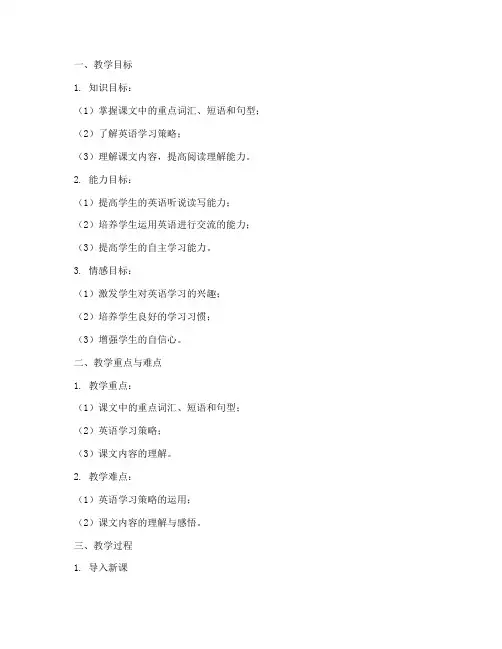
一、教学目标1. 知识目标:(1)掌握课文中的重点词汇、短语和句型;(2)了解英语学习策略;(3)理解课文内容,提高阅读理解能力。
2. 能力目标:(1)提高学生的英语听说读写能力;(2)培养学生运用英语进行交流的能力;(3)提高学生的自主学习能力。
3. 情感目标:(1)激发学生对英语学习的兴趣;(2)培养学生良好的学习习惯;(3)增强学生的自信心。
二、教学重点与难点1. 教学重点:(1)课文中的重点词汇、短语和句型;(2)英语学习策略;(3)课文内容的理解。
2. 教学难点:(1)英语学习策略的运用;(2)课文内容的理解与感悟。
三、教学过程1. 导入新课(1)教师简要介绍英语在国际交流中的重要性;(2)提出本节课的学习目标,激发学生的学习兴趣。
2. 预习课文(1)学生快速浏览课文,了解文章大意;(2)教师提问,检查学生对课文内容的初步理解。
3. 课文精讲(1)教师讲解课文中的重点词汇、短语和句型,并举例说明;(2)分析课文结构,引导学生理解文章大意;(3)讲解英语学习策略,并结合实例进行讲解。
4. 课堂练习(1)学生进行单词拼写、翻译和句型转换练习;(2)教师点评学生的练习,纠正错误。
5. 课堂讨论(1)教师引导学生讨论课文内容,分享自己的学习心得;(2)组织学生进行小组讨论,培养学生的合作意识。
6. 课堂小结(1)教师对本节课的内容进行总结,强调重点和难点;(2)布置课后作业,巩固所学知识。
四、课后作业1. 复习课文,熟记重点词汇、短语和句型;2. 完成课后练习题;3. 撰写一篇关于英语学习策略的短文,分享自己的学习经验。
五、教学反思本节课通过讲解课文、讲解英语学习策略、课堂练习和讨论等形式,帮助学生掌握课文内容,提高阅读理解能力。
在教学过程中,教师应注重激发学生的学习兴趣,培养学生的自主学习能力,提高学生的英语综合运用能力。
同时,教师应关注学生的学习反馈,及时调整教学策略,确保教学效果。
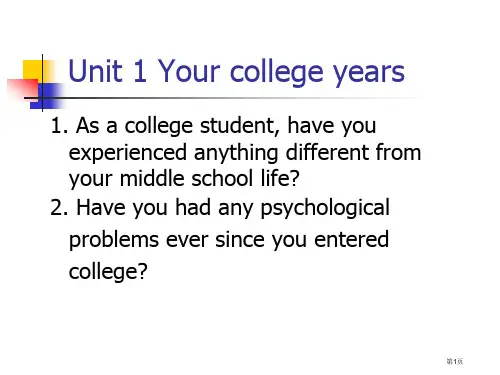
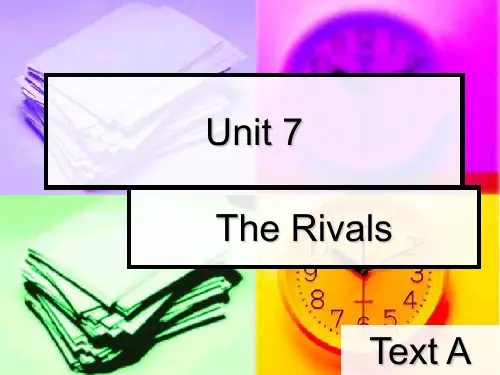
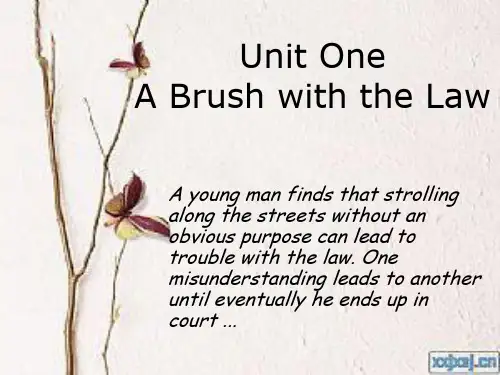
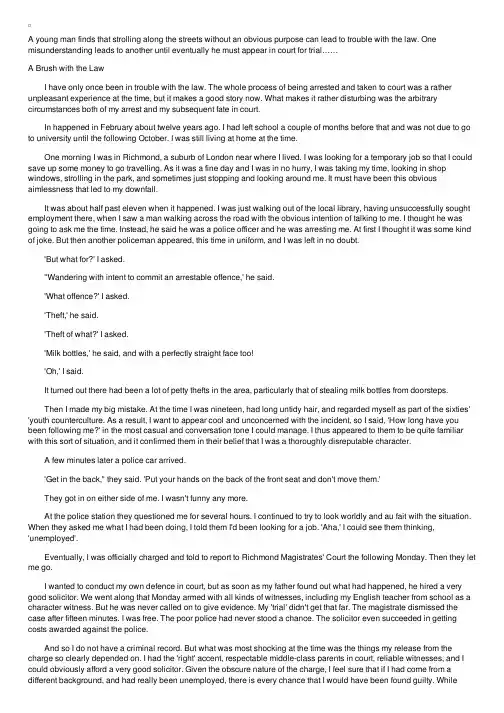
A young man finds that strolling along the streets without an obvious purpose can lead to trouble with the law. One misunderstanding leads to another until eventually he must appear in court for trial……A Brush with the Law I have only once been in trouble with the law. The whole process of being arrested and taken to court was a rather unpleasant experience at the time, but it makes a good story now. What makes it rather disturbing was the arbitrary circumstances both of my arrest and my subsequent fate in court. In happened in February about twelve years ago. I had left school a couple of months before that and was not due to go to university until the following October. I was still living at home at the time. One morning I was in Richmond, a suburb of London near where I lived. I was looking for a temporary job so that I could save up some money to go travelling. As it was a fine day and I was in no hurry, I was taking my time, looking in shop windows, strolling in the park, and sometimes just stopping and looking around me. It must have been this obvious aimlessness that led to my downfall. It was about half past eleven when it happened. I was just walking out of the local library, having unsuccessfully sought employment there, when I saw a man walking across the road with the obvious intention of talking to me. I thought he was going to ask me the time. Instead, he said he was a police officer and he was arresting me. At first I thought it was some kind of joke. But then another policeman appeared, this time in uniform, and I was left in no doubt. 'But what for?' I asked. "Wandering with intent to commit an arrestable offence,' he said. 'What offence?' I asked. 'Theft,' he said. 'Theft of what?' I asked. 'Milk bottles,' he said, and with a perfectly straight face too! 'Oh,' I said. It turned out there had been a lot of petty thefts in the area, particularly that of stealing milk bottles from doorsteps. Then I made my big mistake. At the time I was nineteen, had long untidy hair, and regarded myself as part of the sixties' 'youth counterculture. As a result, I want to appear cool and unconcerned with the incident, so I said, 'How long have you been following me?' in the most casual and conversation tone I could manage. I thus appeared to them to be quite familiar with this sort of situation, and it confirmed them in their belief that I was a thoroughly disreputable character. A few minutes later a police car arrived. 'Get in the back," they said. 'Put your hands on the back of the front seat and don't move them.' They got in on either side of me. I wasn't funny any more. At the police station they questioned me for several hours. I continued to try to look worldly and au fait with the situation. When they asked me what I had been doing, I told them I'd been looking for a job. 'Aha,' I could see them thinking,'unemployed'. Eventually, I was officially charged and told to report to Richmond Magistrates' Court the following Monday. Then they let me go. I wanted to conduct my own defence in court, but as soon as my father found out what had happened, he hired a very good solicitor. We went along that Monday armed with all kinds of witnesses, including my English teacher from school as a character witness. But he was never called on to give evidence. My 'trial' didn't get that far. The magistrate dismissed the case after fifteen minutes. I was free. The poor police had never stood a chance. The solicitor even succeeded in getting costs awarded against the police. And so I do not have a criminal record. But what was most shocking at the time was the things my release from the charge so clearly depended on. I had the 'right' accent, respectable middle-class parents in court, reliable witnesses, and I could obviously afford a very good solicitor. Given the obscure nature of the charge, I feel sure that if I had come from a different background, and had really been unemployed, there is every chance that I would have been found guilty. Whileasking for costs to be awarded, my solicitor's case quite obviously revolved around the fact that I had a 'brilliant academic record'. Meanwhile, just outside the courtroom, one of the policemen who had arrested me was gloomily complaining to my mother that another youngster had been turned against the police. 'You could have been a bit more helpful when we arrested you,' he said to me reproachfully. What did the mean? Presumably that I should have looked outraged and said something like, 'Look here, do you know who you're talking to? I am a highly successful student with a brilliant academic record. How dare you arrest me!' Then they, presumably, would have apologized, perhaps even taken off their caps, and let me on my way. NEW WORDS brush n. brief fight or encounter ⼩冲突;⼩接触 process n. course; method, esp. one used in manufacture 过程;制作法 arbitrary a. based on one's own opinion only, not on reason 任意的;武断的 circumstance n. (usu. pl.) conditions, facts, etc. connected with an event or person 情况,环境 subsequent a. following, later 随后的,接下去的 fate n. what will happen or happened to sb. or sth. 命运 due a. expected; supposed (to)预期的;约定的;到期的 temporary a. lasting only for a limited time 暂时的 stroll a. walk at leisure 散步,闲逛 obvious a. easily seen or understood; clear 明显的,显⽽易见的 downfall n. ruin 垮台;衰落 employment n. one's regular work or occupation; job 职业;⼯作 wander vi. move about without a purpose 闲逛;漫游 commit vt. do (sth. wrong, bad, or unlawful)⼲(坏事),犯(错误、罪) a. deserving to be arrested offence (AmE offense) n. crime; the hurting of feelings; something unpleasant 罪⾏;冒犯;不愉快的事 straight face a face or expression that shows no emotion, humor, or thought 板着的脸 petty a. small; unimportant ⼩的;不⾜道的 doorstep n. a step in front of a door regard vt. consider in the stated way 把……看作;把认为(as) counterculture n. a culture, esp. of the young who oppose the traditional standards and customs of their society 反主流⽂化 unconcerned a. not worried; untroubled; indifferent ⽆忧虑的;淡漠的 casual a. careless; informal 漫不经⼼的,随便的 conversational a. of or commonly used in talking 会话(⽤)的 confirm vt. make certain; support 证实,肯定;确定 belief n. something believed; trust 相信;信念;信仰 thoroughly ad. completely; in every way 完全地,彻底地 thorough a. disreputable a. having or showing a bad character; having a bad name 声名狼籍的 worldly a. experienced in the ways of society ⽼于世故的 au fait a. (F) familiar 熟悉的;精通的 aha int. a cry of surprise, satisfaction, etc. 啊哈! n. civil officer acting as a judge in the lowest courts 地⽅法官 conduct vt. direct the course of; manage 处理;主持;引导;指挥 defence (AmE defense) n. the act of defending in court the person who has been charged 辨护 solicitor n. (esp. in Britain) lawyer who advises clients on legal matters and speaks on their behalf in lower courts (初级)律师 witness n. a person who gives evidence in a court of law; sth. serving as evidence or proof 证⼈;证据 trial n. the act or fact of examining and deciding a civil or criminal case by a law court 审判 dismiss vt. (of a judge) stop (a court case)驳回,对……不予受理 cost n. (pl.) the cost of having a matter settled in a law court. esp. that paid to the winning party by the losing party 诉讼费 award vt. give by a decision in court of law; give or grant by an official decision 判给;授予 accent n. way of speaking typical of the natives or residents of a region, or of any other group ⼝⾳;腔调 respectable a. deserving respect 值得尊敬的 reliable a. that may be relied or depended upon 可靠的,可信赖的 given prep. taking into account; if allowed or provided with 考虑到;假定 obscure a. not clearly seen or understood 模糊的;晦涩的 guilty a. having broken a law; showing or feeling that one has done wrong 有罪的;内疚的 revolve v. (cause to) go round in a circle (使)旋转 brilliant a. causing great admiration or satisfaction; splendid 辉煌的;卓越的 courtroom n. a room where a law court is held 审判室 meanwhile ad. during the same period of time 同时 gloomily ad. depressedly, dejectedly 忧郁地;沮丧地 complain vi. speak in an unhappy, annoyed, dissatisfied way 抱怨 complaint n. reproachfully ad. 责备地 presumably ad. probably outrage vt. arouse anger or resentment by injury or insult 引起……的⽓愤 successfula. having done what one has tried to do; having gained a high position in life, one's job. etc. 成功的;有成就的 apologize vi. say one is sorry 道歉,谢罪 apology n. PHRASES & EXPRESSIONS take sb. to court start an action in law against sb. 对某⼈提出诉讼 a couple of (informal) a small number of, a few, usually two 少数,⼏(个);⼀对 save up keep for future use; put money away in the form of savings 储蓄 take one's time do sth. in a leisurely manner; not hurry 慢慢来,不着急 at first at the beginning 起先 turn out prove to be 结果;证明是 call on ask (sb.) to do sth. esp. formally 要求 stand a chance have an opportunity; be likely to do or get sth. 有机会,有希望 revolve around have as a center or main subject turn against (cause to) oppose, be hostile to PROPER NAMES Richmond ⾥⼠满(英国地名) Richmond Magistrates' Court ⾥⼠满地⽅法院。
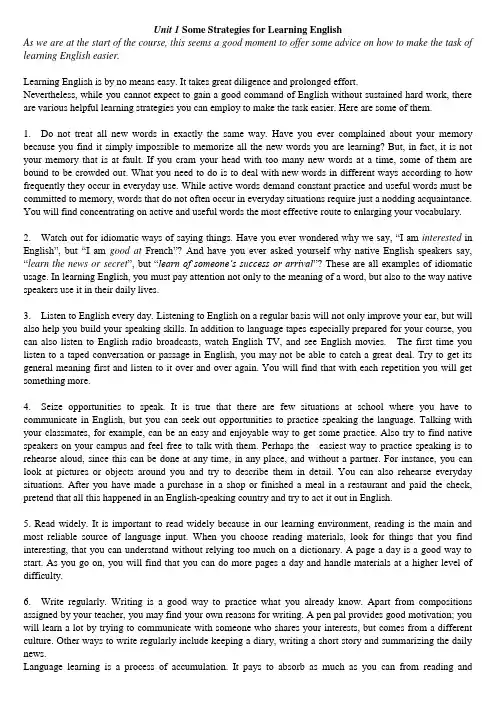
Unit 1 Some Strategies for Learning EnglishAs we are at the start of the course, this seems a good moment to offer some advice on how to make the task of learning English easier.Learning English is by no means easy. It takes great diligence and prolonged effort.Nevertheless, while you cannot expect to gain a good command of English without sustained hard work, there are various helpful learning strategies you can employ to make the task easier. Here are some of them.1. Do not treat all new words in exactly the same way. Have you ever complained about your memory because you find it simply impossible to memorize all the new words you are learning? But, in fact, it is not your memory that is at fault. If you cram your head with too many new words a t a time, some of them are bound to be crowded out. What you need to do is to deal with new words in different ways according to how frequently they occur in everyday use. While active words demand constant practice and useful words must be committed to memory, words that do not often occur in everyday situations require just a nodding acquaintance. You will find concentrating on active and useful words the most effective route to enlarging your vocabulary.2. Watch out for idiomatic ways of saying things. Have you ever wondered why we say, “I am interested in English”, but “I am good at French”? And have you ever asked yourself why native English speakers say, “learn the news or secret”, but “learn of someone’s success or arrival”? These are all exampl es of idiomatic usage. In learning English, you must pay attention not only to the meaning of a word, but also to the way native speakers use it in their daily lives.3. Listen to English every day. Listening to English on a regular basis will not only improve your ear, but will also help you build your speaking skills. In addition to language tapes especially prepared for your course, you can also listen to English radio broadcasts, watch English TV, and see English movies. The first time you listen to a taped conversation or passage in English, you may not be able to catch a great deal. Try to get its general meaning first and listen to it over and over again. You will find that with each repetition you will get something more.4. Seize opportunities to speak. It is true that there are few situations at school where you have to communicate in English, but you can seek out opportunities to practice speaking the language. Talking with your classmates, for example, can be an easy and enjoyable way to get some practice. Also try to find native speakers on your campus and feel free to talk with them. Perhaps the easiest way to practice speaking is to rehearse aloud, since this can be done at any time, in any place, and without a partner. For instance, you can look at pictures or objects around you and try to describe them in detail. You can also rehearse everyday situations. After you have made a purchase in a shop or finished a meal in a restaurant and paid the check, pretend that all this happened in an English-speaking country and try to act it out in English.5. Read widely. It is important to read widely because in our learning environment, reading is the main and most reliable source of language input. When you choose reading materials, look for things that you find interesting, that you can understand without relying too much on a dictionary. A page a day is a good way to start. As you go on, you will find that you can do more pages a day and handle materials at a higher level of difficulty.6. Write regularly. Writing is a good way to practice what you already know. Apart from compositions assigned by your teacher, you may find your own reasons for writing. A pen pal provides good motivation; you will learn a lot by trying to communicate with someone who shares your interests, but comes from a different culture. Other ways to write regularly include keeping a diary, writing a short story and summarizing the daily news.Language learning is a process of accumulation. It pays to absorb as much as you can from reading andlistening and then try to put what you have learned into practice through speaking and writing.New Words(1) strategy n. -- 战略学,兵法I admired the general who was a master of strategy. 我敬佩那位精通兵法的将军。
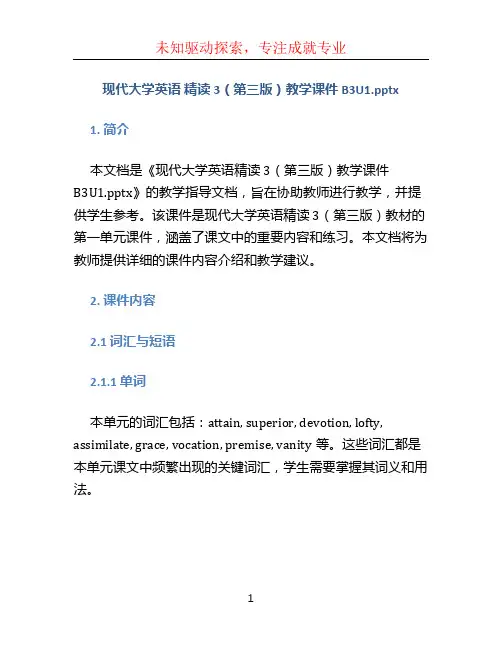
现代大学英语精读3(第三版)教学课件B3U1.pptx1. 简介本文档是《现代大学英语精读3(第三版)教学课件B3U1.pptx》的教学指导文档,旨在协助教师进行教学,并提供学生参考。
该课件是现代大学英语精读3(第三版)教材的第一单元课件,涵盖了课文中的重要内容和练习。
本文档将为教师提供详细的课件内容介绍和教学建议。
2. 课件内容2.1 词汇与短语2.1.1 单词本单元的词汇包括:attain, superior, devotion, lofty, assimilate, grace, vocation, premise, vanity等。
这些词汇都是本单元课文中频繁出现的关键词汇,学生需要掌握其词义和用法。
2.1.2 短语本单元的短语包括:be indicative of, bring out, take…seriously, measure up to, in good part等。
教师可以通过例句和实例来帮助学生理解这些短语的含义和用法。
2.2 阅读理解本单元的阅读理解部分涵盖了三篇文章,分别是《选择正确的途径》、《智慧的力量》和《忠诚的战士》。
教师可以通过课件中的题目和文字说明帮助学生理解文章内容,并进行讨论和解答相关问题。
2.3 语法与写作本单元的语法重点是介词和非谓语动词的用法。
教师可以利用课件中的例句和练习来讲解和巩固学生对这些语法知识的掌握。
此外,课件还包括写作部分,教师可以引导学生根据所学的语法知识写作相关的练习作文。
3. 教学建议3.1 教学方法教师可以采用多种教学方法来教授本单元内容,如讲解法、示范法和讨论法等。
在讲解词汇和短语时,可以先通过示范法来引导学生正确使用,然后进行讨论和实践。
在阅读理解部分,可以采用讨论法来引导学生分析文章内容,并提出自己的见解和观点。
在语法与写作部分,可以通过讲解法和实践法相结合,引导学生掌握语法知识,并培养写作能力。
3.2 学生活动教师应鼓励学生积极参与课堂活动,并提供一些学生活动的建议,如词汇卡片制作和交流、小组讨论、写作练习等。
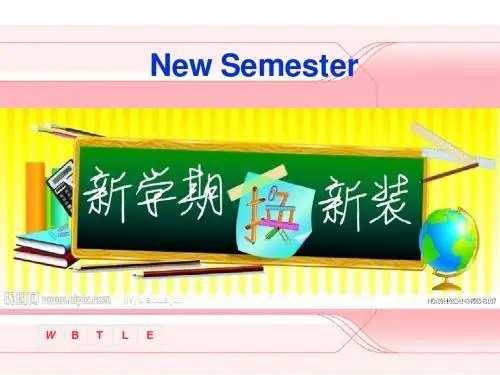
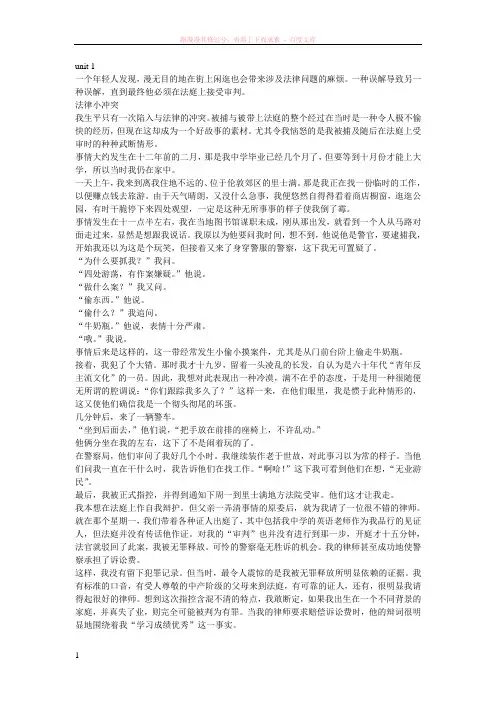
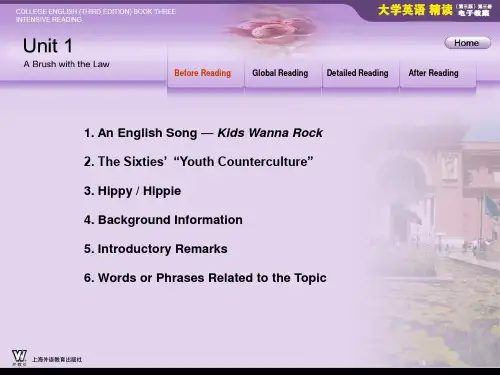
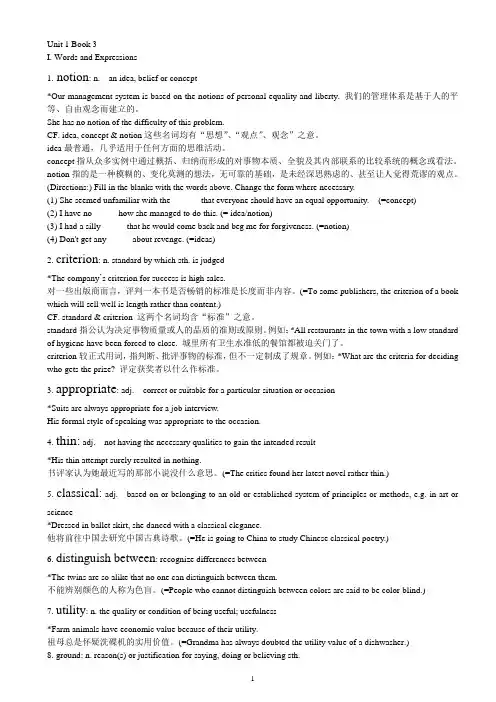
Unit 1 Book 3I. Words and Expressions1. notion: n. an idea, belief or concept*Our management system is based on the notions of personal equality and liberty. 我们的管理体系是基于人的平等、自由观念而建立的。
She has no notion of the difficulty of this problem.CF. idea, concept & notion这些名词均有“思想”、“观点”、观念”之意。
idea最普通,几乎适用于任何方面的思维活动。
concept指从众多实例中通过概括、归纳而形成的对事物本质、全貌及其内部联系的比较系统的概念或看法。
notion指的是一种模糊的、变化莫测的想法,无可靠的基础,是未经深思熟虑的、甚至让人觉得荒谬的观点。
(Directions:) Fill in the blanks with the words above. Change the form where necessary.(1) She seemed unfamiliar with the ______ that everyone should have an equal opportunity. (=concept)(2) I have no _____ how she managed to do this. (= idea/notion)(3) I had a silly _____ that he would come back and beg me for forgiveness. (=notion)(4) Don't get any _____ about revenge. (=ideas)2. criterion: n. standard by which sth. is judged*The company’s criterion for success is high sales.对一些出版商而言,评判一本书是否畅销的标准是长度而非内容。
大学英语精读第三册第三版(上海外语教育出版社)答案第三版Unit11) accent 2) turn against 3) a couple of 4) takes his time 5) fate 6) confirmed 7) witness 8) subsequent 9) stands a chance 10) trial1) belief 2) brilliant 3) employment 4) has saved up 5) stood a chance 6) were awarded 7) Presumably 8) conducted 9) casual 10) around (which student life) revolves1) Joe wrote to say that he had to put off his visit because of his illness.2) Despite the noise, they went on working as if nothing were happening3) Traffic was held up for several hours by the accident.4) Called (up) on to speak at the meeting, I couldn't very well refuse.5) Mrs. Stevenson looked in the cupboard and found there was not a single lump of sugar left.6) It was the rumor that turned Joe against his twin brother.7) We wondered how Sara was getting on in her new job.8) Although Anne agreed with me on most points, there was one on which she was unwilling to give in.9) Visitors could photograph almost anything here without having to ask for permission.10) Whether we make an excursion or stay home will depend on tomorrow's weather.1) uncertain,unafraid,unacceptable,unfamiliar,unequal;2) unanswered,unattached,unknown,undecided,unexpected;3) unhappily,unskillfully,unconsciously,unnecessarily,uncomfortably;4) unsay,undress,untie,unlock,unload。
外研社现代大学英语(第三版)精读3B3U1引言《外研社现代大学英语(第三版)精读3B3U1》是外研社出版的一本英语教材,适用于大学英语精读课程的教学。
本文档将介绍该教材的第三单元第一课的内容和教学目标。
教学目标本课的教学目标主要包括:1.学习如何描述人物的外貌和性格特点;2.掌握用英语询问和回答关于外貌和性格的问题;3.锻炼学生的听、说、读、写的综合能力;4.培养学生的团队合作和自主学习能力。
课程设计1. 课前准备在上课前,学生需要预习课本第三单元的课文,并熟悉生词和语法点。
教师可以提前准备好课件和教学素材,并检查学生是否按时完成了课前作业。
2. 导入新课教师可以通过呈现一张著名人物的照片,向学生展示人物的外貌特征,并引发学生对外貌和性格的讨论。
通过与学生的互动,激发学生的兴趣,引入新课。
3. 听力理解首先,教师播放课文的录音,并要求学生仔细听,并回答一些问题。
通过听力训练,学生可以更好地理解课文的内容和语言表达方式。
4. 阅读与理解学生在听力理解之后,阅读课文,并回答相关的问题。
同时,教师可以教授一些阅读技巧,帮助学生提高阅读理解的能力。
5. 语法讲解教师可以通过课文中的例句,讲解一些有关外貌和性格描述的语法知识。
例如,形容词的比较级和最高级的用法,特殊疑问句的构造等等。
6. 口语练习在口语练习环节,教师可以设计一些角色扮演活动,让学生练习用英语询问和回答关于外貌和性格的问题。
学生可以分成小组,互相面试,加强口语表达和听力理解的能力。
7. 作文训练最后,教师可以布置一篇关于自己或他人外貌和性格特点的作文。
学生可以在课后完成,并通过互相交流和修改,提高写作能力。
总结通过对《外研社现代大学英语(第三版)精读3B3U1》教材的介绍,我们可以看到该教材设计合理,既注重学生的兴趣和实际运用能力,又培养了学生的综合能力。
教师在教学过程中,应根据学生的实际情况,灵活运用各种教学方法和资源,帮助学生有效地学习和掌握英语精读的技巧和知识。